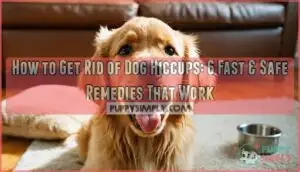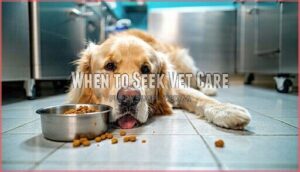This site is supported by our readers. We may earn a commission, at no cost to you, if you purchase through links.

Offer small sips of water to help regulate their breathing.
Gently massage their chest and belly in circular motions.
Take them for a slow, calm walk to reset their diaphragm.
Most dog hiccups happen when they eat too fast or get excited, and they’re usually harmless.
You can also try giving them a small treat to interrupt the hiccup cycle.
These episodes typically last just a few minutes and resolve on their own.
However, if hiccups persist for hours or happen frequently, there are deeper strategies and warning signs you should know about.
Table Of Contents
- Key Takeaways
- Dog Hiccup Causes
- Get Rid of Dog Hiccups
- Hiccup Symptoms in Dogs
- Relieving Dog Hiccups
- Preventing Dog Hiccups
- Dog Hiccup Remedies
- When to Seek Vet Care
- Managing Dog Hiccups
- Frequently Asked Questions (FAQs)
- How do you get rid of hiccups in dogs?
- Why do dogs get hiccups?
- Are hiccups bad for dogs?
- Can hiccups help a dog’s upset stomach?
- Do I need a vet if my dog has hiccups?
- Do dog hiccups go away?
- How do I stop my dog’s hiccups?
- Are hiccups uncomfortable for dogs?
- How long do hiccups last in dogs?
- What stops hiccups quickly?
- Conclusion
Key Takeaways
- Offer simple remedies first – Give your dog small sips of water, gently massage their chest and belly, or take them for a short, calm walk to interrupt the hiccup cycle naturally.
- Address the root causes – Use slow feeder bowls, serve smaller meals throughout the day, and keep your dog calm during feeding time to prevent the air swallowing that triggers most hiccups.
- Don’t panic about normal hiccups – Most dog hiccups resolve on their own within 10-15 minutes and are completely harmless, especially in puppies, who experience them more frequently.
- Know when to call your vet – Contact your veterinarian if hiccups persist for more than an hour, happen daily, or occur with other symptoms, like vomiting, difficulty breathing, or lethargy.
Dog Hiccup Causes
Your dog’s hiccups happen when their diaphragm muscle suddenly contracts, just like yours do.
Most hiccups come from eating too fast, drinking quickly, getting excited, or swallowing too much air during meals.
Eating or Drinking Too Quickly
Gulping air while eating fast is your dog’s ticket to hiccup city.
When your pup wolfs down dinner, they’re basically signing up for a diaphragm dance party.
When pups wolf down food or water, they’re swallowing extra air that irritates the diaphragm.
Large breeds face breed predisposition to bloat, making slower eating habits essential.
Try slow feeder bowls and smaller meals to improve hydration habits and prevent dog hiccups through simple dietary adjustments.
Spicy Food
Never give your dog spicy food – it’s a recipe for hiccups and stomach upset.
Capsaicin sensitivity varies between dogs, but even mild spice can trigger diaphragm spasms.
Your pup’s taste preferences lean toward bland, safe alternatives like plain chicken or rice.
The digestive impact of spicy foods causes irritation, leading to quick water drinking and excess air swallowing.
Breed differences don’t matter here. Dogs experience hiccups due to involuntary diaphragm contractions.
Stress or Overexcitement
When your dog’s emotional state shifts into overdrive, stress and anxiety can trigger those telltale hiccups.
When stress levels spike, your pup’s diaphragm goes haywire—turning excitement into hiccup episodes that need your calming touch.
Creating a calm environment helps reduce this common trigger through effective anxiety reduction techniques.
Watch for these behavioral patterns that signal stress-induced hiccups:
- Rapid panting during excitement
- Restless pacing before meals
- Whining or excessive barking
- Trembling during new experiences.
Training techniques focusing on relaxation can stop dog hiccups before they start, and creating a calm environment is key to this process.
Stomach Gas
When excess gas builds up in your dog’s stomach, it creates pressure that irritates the diaphragm and triggers hiccups. This GI issue often stems from diet changes, swallowing air, or an upset stomach.
Gas buildup can lead to bloat prevention concerns, especially in larger breeds. Consider probiotics help for digestive balance, and avoid vigorous exercise impact immediately after meals to reduce antacids needs.
Get Rid of Dog Hiccups
Now that you understand what triggers your dog’s hiccups, you’ll want quick relief methods that actually work.
Most dog hiccups resolve naturally within 10-15 minutes, but these home remedies can speed up the process safely.
When your pup gets the hiccups, try these proven methods for quick relief:
- Offer small sips of water – This stimulates the vagus nerve and helps reset the diaphragm’s rhythm
- Gentle chest massage – Light circular motions can release trapped air and ease muscle spasms
- Encourage calm breathing – Breathing exercises through gentle play or short walks break the hiccup cycle
- Create a relaxing environment – Reduce excitement and stress that often worsen puppy hiccups
- Wait it out patiently – Most dog hiccup episodes stop on their own without intervention
These dog hiccup remedies work because they address the root cause while keeping your furry friend comfortable and safe.
Hiccup Symptoms in Dogs
You’ll notice dog hiccups through jerky body movements paired with audible "hic" sounds or silent stomach contractions.
These symptoms appear as rhythmic spasms in your dog’s chest and belly area, sometimes causing their entire body to shake briefly, which can be identified by jerky body movements.
Reverse Hiccups
Unlike regular dog hiccups, reverse hiccups involve your dog making loud, honking sounds as they forcefully inhale.
These episodes result from sinus irritation or throat issues, causing muscle spasms in the pharynx.
While concerning to witness, reverse hiccups typically resolve naturally and rarely require medical evaluation unless persistent or accompanied by breathing difficulties.
Dogs experiencing this may be suffering from nasal passage irritation.
| Regular Hiccups | Reverse Hiccups |
|---|---|
| Outward air expulsion | Forceful inward breathing |
| Diaphragm spasms | Throat muscle contractions |
| "Hic" sounds | Honking, snorting sounds |
| Brief episodes | Can last longer |
| Less alarming appearance | More dramatic presentation |
Audible Contractions
Most dog hiccups create distinctive sounds you’ll easily recognize.
Identifying sounds helps you distinguish between normal hiccups and other respiratory issues. The rhythmic patterns and intensity variation can guide your dog hiccup remedy approach.
Watch for these audible contraction signs:
- Sharp "hic" sounds – Classic hiccup noise from diaphragm spasms
- Frequency changes – Rapid succession followed by slower intervals
- Contraction location – Sounds originating from chest area
Silent Contractions
Not all dog hiccups make noise. Silent contractions happen when your dog’s diaphragm spasms without the typical "hic" sound.
You’ll notice rhythmic jerking in their chest or belly area instead. Detecting silent contractions requires watching for subtle movement patterns that differentiate contraction types from normal breathing. Changes in behavior can also be an indicator of illness.
| Silent Hiccup Signs | What You’ll See | Duration |
|---|---|---|
| Chest jerking | Quick, rhythmic movements | 5-15 seconds |
| Belly spasms | Stomach area contracts | 10-30 seconds |
| Body shaking | Whole body trembles slightly | 15-45 seconds |
| Breathing changes | Irregular breath patterns | 20-60 seconds |
| Posture shifts | Dog repositions frequently | Variable timing |
Relieving Dog Hiccups
When your dog gets hiccups, you can use several simple methods to help them feel better quickly.
These gentle techniques work by calming the diaphragm spasms that cause the hiccups in the first place.
Small Amounts of Water
When your pup gets hiccups, offering small sips of room-temperature water often works like magic.
This simple dog hiccups home remedy helps reset their diaphragm naturally.
Keep hydration levels steady by encouraging calm, slow drinking – no gulping allowed.
For puppy hiccups, try ice cubes as water alternatives, and remember that proper administration methods matter: let them drink at their own pace.
Pet-Safe Antacids
Several antacid types can help treat dog hiccups when stomach irritation is the culprit.
Calcium carbonate, famotidine, and omeprazole are veterinary-approved options.
However, dosage guidelines vary substantially by weight, and side effects like diarrhea can occur.
Long-term use isn’t recommended without professional oversight.
Always seek veterinary advice before administering any dog hiccups treatment, as safer alternatives often exist.
Some dogs benefit from digestive health treats designed for sensitive stomachs to address dog hiccups and promote overall digestive health.
Chest and Belly Massages
Beyond antacids, gentle massages offer immediate diaphragm relief for your hiccupping pup.
These simple massage techniques help release trapped air while promoting relaxation benefits that naturally calm spastic breathing.
Here’s how to cure dog hiccups with chest massage:
- Place your palm on your dog’s chest below the ribcage
- Apply gentle, circular motions for 30-60 seconds
- Move to light belly rubs using fingertips
- Focus on the diaphragm area with soft pressure
- Continue until hiccups subside completely
Preventing Dog Hiccups
You can stop dog hiccups before they start by controlling how your dog eats and drinks.
Simple changes like using slow feeder bowls, offering smaller meals throughout the day, and keeping your dog calm during feeding time will reduce the air swallowing that causes most hiccups.
Slow Feeder Bowls
Slow-feeder bowls tackle the root cause of dog hiccups by preventing gulping and air swallowing.
Size matters when choosing the right bowl for your dog breed – larger dogs need deeper designs.
Bowl material affects cleaning ease and durability.
Many pet owners purchase durable slow feeders to help manage their pet’s eating habits.
Alternative designs like puzzle feeders and snuffle mats also slow eating habits, reducing hiccup frequency through controlled consumption patterns, which can be achieved with durable slow feeders and by preventing air swallowing.
Smaller Meals
Feeding your dog multiple small meals throughout the day works wonders for preventing dog hiccups.
This approach improves portion control and supports better digestive health compared to one large meal.
Whether you’re managing puppy feeding schedules or adjusting senior diets, breaking up meal frequency reduces the gulping that triggers hiccups.
Your dog’s feeding habits directly impact their comfort and well-being.
Reduced Stress
Creating a calming environment helps prevent stress-induced hiccups in your furry friend.
Anxiety reduction through gentle playtime and relaxing activities works wonders for dog hiccups relief. Try comfort measures like soft music, consistent routines, and quiet spaces.
These pet relaxation techniques reduce your dog’s stress levels naturally. When relaxation becomes routine, pet anxiety relief follows, making hiccups less frequent, with gentle playtime, relaxing activities, and calming environment being key to this process.
Dog Hiccup Remedies
When your dog gets hiccups, you can use simple remedies to help them feel better quickly.
These gentle methods work by relaxing your dog’s diaphragm and stopping the muscle spasms that cause hiccups.
Gentle Walks
A gentle walk can work wonders when your dog’s hiccups won’t quit.
Light movement helps break the diaphragm’s spasm cycle, providing natural dog hiccups relief.
Keep walk timing short—just five minutes around the block.
Weather considerations matter; avoid extreme temperatures that might worsen breathing.
Consider using a comfortable walking harness for these brief walks.
This simple dog hiccups solution works across all breed differences, offering your pup freedom from those annoying contractions, and it’s a great way to provide relief and ensure your dog’s comfort.
Calming Treats
Calming treats offer a gentle dog hiccups solution when stress triggers those annoying spasms.
These specially formulated snacks help with anxiety reduction while providing a natural way to stop dog hiccups fast. The CBD dosage per treat should be carefully considered to guarantee effectiveness.
Consider these key factors when choosing calming treats:
- Treat ingredients like chamomile, valerian root, or L-theanine promote relaxation
- Dosage guidelines vary by weight, so follow package instructions carefully
- Brand comparisons reveal CBD-infused options often work faster than traditional herbal remedies
Gentle Stomach Rubs
Simple rubbing techniques can work wonders for your hiccupping pup.
Apply gentle pressure points around the chest and belly area using circular motions.
These massage benefits help release trapped air while strengthening owner bonding.
Puppy rubs require extra care – use lighter pressure on smaller bodies.
For additional guidance, consider a puppy massage guide.
This pet comfort method provides natural hiccup remedies through soothing chest massage and belly rubs that offer immediate dog hiccups help with gentle pressure.
When to Seek Vet Care
Most dog hiccups resolve on their own within minutes, but you should contact your vet if they persist for more than an hour or occur with other symptoms like vomiting, difficulty breathing, or lethargy.
Frequent hiccups that happen daily or hiccups accompanied by coughing, drooling, or loss of appetite may signal underlying health problems that need professional attention, such as vomiting or difficulty breathing.
Persistent Hiccups
Most dog hiccups stop within minutes, but persistent hiccups lasting over an hour need veterinary care.
Your vet can perform diagnostic tests to rule out underlying conditions like respiratory infections or heart problems.
Changes in behavior, such as increased whining, can also be a sign of illness.
Don’t ignore hiccups that won’t quit—they might signal serious health issues requiring treatment options beyond simple hiccup remedies at home, which could be a matter of veterinary care.
Underlying Health Issues
Sometimes hiccups signal bigger problems lurking beneath the surface.
Respiratory infections, cardiac problems, neurological disorders, parasitic infestations, and metabolic imbalances can all trigger persistent hiccups.
Gastrointestinal problems and heart problems often hide behind what seems like harmless hiccupping.
If your dog’s hiccups accompany other symptoms, veterinary consultation becomes necessary to protect their respiratory health and overall well-being.
Respiratory Diseases
Several respiratory diseases can trigger persistent hiccups in your dog.
Pneumonia hiccups occur when lung infections irritate the diaphragm. Kennel cough creates throat inflammation that leads to hiccuping episodes.
Asthma triggers diaphragm spasms, while bronchitis link causes airway irritation. Sinus infections affect breathing patterns.
These respiratory illnesses compromise your dog’s respiratory health, requiring immediate veterinary attention for proper diagnosis and treatment.
Managing Dog Hiccups
You can take control of your dog’s hiccup episodes by staying alert to warning signs and working with your vet to address any underlying health issues.
Regular check-ups help you catch problems early, while keeping track of hiccup patterns gives you and your vet valuable information for proper treatment.
You can use this information to help your dog by being aware of warning signs.
Regular Veterinary Check-Ups
Routine vet visits form the backbone of effective pet health management and dog hiccups prevention.
Your veterinarian provides expert veterinary diagnosis and veterinarian advice suited to your dog’s needs.
- Vaccination Schedules keep respiratory illnesses at bay
- Parasite Prevention stops internal irritants causing hiccups
- Early Detection catches underlying conditions before they worsen
- Breed Predispositions assessment for brachycephalic breathing issues
- Overall Wellness evaluations guarantee your pup stays hiccup-free
Monitoring Health
Keep a watchful eye on your pup’s overall well-being when hiccups occur.
Monitor hiccup frequency and duration, noting any worrying symptoms like changes in breathing patterns, appetite changes, or unusual behavioral changes.
Check their gum color and vaccination status regularly.
If your dog shows signs of distress or hiccups persist, seek veterinary attention promptly.
Addressing Underlying Causes
Identifying hiccups causes dogs experience requires examining multiple factors.
Dietary adjustments like switching from spicy foods can eliminate triggers, while environmental factors such as temperature changes need monitoring.
Medication review with your vet helps identify problematic prescriptions.
Behavioral analysis reveals eating patterns causing issues, and some breeds face breed predisposition to acid reflux, GI issues, or parasites requiring targeted treatment approaches.
Frequently Asked Questions (FAQs)
How do you get rid of hiccups in dogs?
Offer your dog a small sip of water or gently massage their chest and belly.
Take them for a short, calm walk or provide gentle distractions.
Most hiccups resolve naturally within minutes.
Why do dogs get hiccups?
Like a hiccup symphony, your dog’s diaphragm spasms when they gulp air too quickly while eating, drinking, or getting excited.
Puppies experience this more often due to weaker muscles and their enthusiastic approach to life.
Are hiccups bad for dogs?
Hiccups aren’t harmful to your dog.
They’re completely normal, especially in puppies.
Most hiccups resolve naturally within 10-15 minutes.
You only need to worry if they persist for hours or come with other symptoms.
Can hiccups help a dog’s upset stomach?
Stomach upset, digestive distress, and gastrointestinal discomfort aren’t helped by hiccups.
They don’t aid digestion or settle your dog’s tummy.
Instead, hiccups might worsen nausea since they’re involuntary spasms that can increase stomach irritation and discomfort.
Do I need a vet if my dog has hiccups?
Most dog hiccups don’t require a vet visit since they’re harmless and resolve within 10-15 minutes.
However, seek veterinary care if hiccups persist over a day or accompany vomiting, lethargy, or breathing difficulties, as these could indicate a need for veterinary attention.
Do dog hiccups go away?
Just as childhood troubles fade with time, your pup’s hiccups typically vanish on their own within 10-15 minutes.
You don’t need to worry—these harmless spasms naturally resolve as your dog’s diaphragm relaxes.
How do I stop my dog’s hiccups?
Offer your pup a small sip of water or gently massage their chest and belly.
Take them for a short, calm walk or provide gentle distractions to break the hiccup cycle naturally.
Are hiccups uncomfortable for dogs?
Like watching your toddler get the hiccups after gulping juice, dogs experience mild discomfort but aren’t in pain.
Most pups handle hiccups well—they’re simply annoying interruptions that resolve naturally without causing distress.
How long do hiccups last in dogs?
Most dog hiccups resolve naturally within 10-15 minutes or less.
You’ll typically see them disappear on their own as your pup’s diaphragm relaxes.
Puppies may experience shorter episodes lasting just a few minutes, but generally, most dog hiccups resolve quickly.
What stops hiccups quickly?
Water works wonders for stopping hiccups fast.
You can offer your pup a small sip or ice cube.
Gentle belly massages and short walks also break the spasm cycle quickly and effectively, which can be considered as complete concepts to stop hiccups.
Conclusion
Dogs naturally resolve most hiccups within minutes without intervention, proving that patience often works best.
However, knowing how to get rid of dog hiccups empowers you to provide immediate comfort when needed.
Simple remedies like offering water, gentle massage, or slow walks effectively interrupt hiccup cycles.
Monitor your pet for persistent episodes lasting over an hour, as these may indicate underlying health concerns requiring veterinary attention.
These proven techniques guarantee your furry friend stays comfortable and healthy.

















